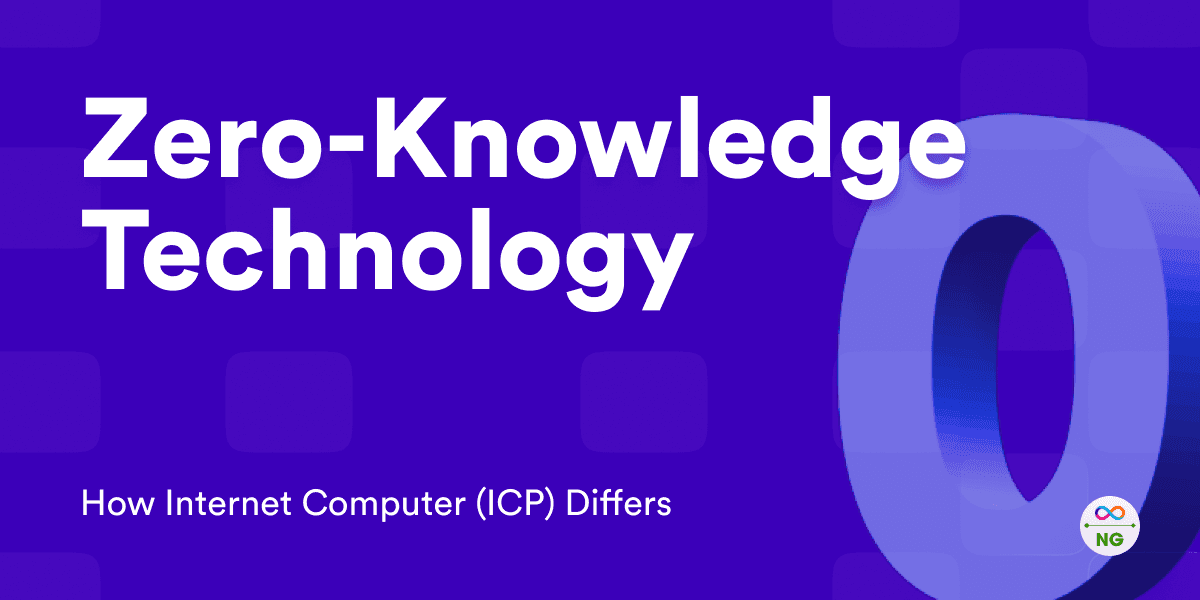
Zero-knowledge technology is quickly becoming a household term in blockchain conversations. From discussions about privacy to debates around scalability, it’s often positioned as a game-changer—and for good reason.
However, while many blockchains lean heavily on zero-knowledge proofs to enhance security and protect user data, the Internet Computer Protocol (ICP) operates from a completely different angle.
To truly appreciate what ICP brings to the table, it helps to understand what zero-knowledge technology is and what makes the Internet Computer stand apart in both design and philosophy.
Zero-knowledge proofs, often shortened to ZKPs, are a cryptographic technique that allows someone to prove they know something without revealing the actual content of what they know. In blockchain, this means a user can prove a transaction is valid without exposing the data behind it.
It's a powerful privacy tool that ensures verification without compromise. This method is foundational in systems like zkSync, StarkNet, Mina, and other projects focused on private, efficient computation.
ZKPs come in different forms, such as zk-SNARKs and zk-STARKs. These technologies enable blockchain systems to scale by reducing the computational load on the main chain. Instead of every node redoing the same work, a succinct proof is submitted that verifies the job was done correctly. It's efficient, scalable, and privacy-preserving—making it an attractive option for certain categories of decentralized applications.
Now here’s where the Internet Computer takes a different path.
Rather than relying on zero-knowledge technology, ICP is built on chain key cryptography—a unique and advanced cryptographic system that gives the blockchain a single public key. This design allows for lightweight and secure verification of the entire system's state, even from something as simple as a smartphone browser. It's not about hiding data; it's about making decentralized computation fast, scalable, and natively accessible to the open internet.
ICP doesn't need off-chain computation to scale. Its model is built for horizontal scaling across independent subnets. Each subnet can host canister smart contracts—software units that contain both code and memory, running at web speed. These canisters allow developers to build powerful backend logic, connect directly to the internet, and serve user interfaces with no centralized infrastructure.
While zero-knowledge proofs center on secrecy and succinctness, ICP focuses on transparency, performance, and real-world usability. The architecture allows for seamless integrations, such as its direct interaction with the Bitcoin network, using native signatures rather than wrapped tokens or bridges.
Privacy isn't ignored on ICP, but it’s handled differently. Developers can encrypt data within canisters or build access-controlled systems without needing zero-knowledge by default. And with the way ICP evolves, the door remains open for future support or integration of ZK-based solutions when the use case demands it.
In the blockchain world, zero-knowledge tech is used to:
- Keep people’s data private
- Prove transactions happened without showing the details
- Help blockchains run faster by doing the hard work off-chain and only showing a tiny proof
Blockchains like zkSync, StarkNet, and Mina use this kind of tech to focus on privacy and speed.
In the Blockchain world, ICP — the Internet Computer Protocol:
- Doesn’t need to send data off-chain to scale — it can grow by adding more “subnets” (which are like mini blockchains working together)
- It has smart contracts called canisters that can hold memory and do advanced tasks
- It uses a cool kind of cryptography called chain key cryptography, which makes it easy to verify things from any device — even your phone
- It can connect directly to other blockchains like Bitcoin, without using bridges or middlemen
Zero-knowledge technology is impressive. It solves problems that once seemed insurmountable, especially in the realm of privacy-focused decentralized finance. But it's not the only route to innovation. The Internet Computer proves that scaling and decentralization don’t have to come at the cost of usability, speed, or openness.
ICP empowers builders to rethink the internet entirely, offering a transparent, on-chain, high-performance platform for full-stack decentralized applications.
Article By: Mana Lamja